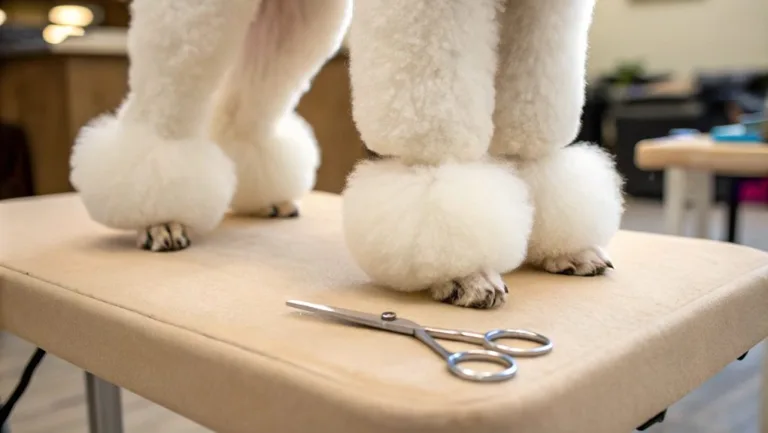Are Poodles Aggressive? Is Aggression Normal For This Breed

Poodles aren’t naturally aggressive dogs – they’re actually known for their intelligence, affection, and loving temperament.
If you’re seeing aggressive behavior in a Poodle, it’s typically due to poor training, lack of socialization, or underlying anxiety rather than breed characteristics.
While Standard Poodles may sometimes get an unfair reputation due to their size and protective nature, all Poodle varieties can become well-adjusted, friendly companions with proper training and early socialization.
Your Poodle’s behavior largely depends on how you raise them, and understanding the common triggers for aggression will help you prevent potential issues before they start.
Understanding Poodle Aggression Myths
Despite popular misconceptions, Poodles aren’t naturally aggressive dogs. In fact, this dog breed is known for being highly intelligent, loving, and affectionate with their families.
While some people may have had negative experiences with aggressive Poodles, these incidents typically stem from poor training and socialization rather than inherent aggression in poodles.
Standard Poodles, in particular, have gained an unfair reputation for aggression due to their size and protective nature.
However, proper training and early socialization can prevent most behavioral issues. Like any intelligent breed, Poodles need clear boundaries and consistent leadership from their owners to thrive.
Poodle temperament is naturally friendly and adaptable, though they can be initially wary of strangers.
This wariness shouldn’t be confused with aggression – it’s simply part of their heritage as working dogs. Poodle owners who invest time in proper training will find their dogs to be well-adjusted and social.
Without appropriate guidance, Poodles may develop anxiety or dominance issues that can manifest as aggressive behaviors.
The key to preventing aggression lies in understanding that these behaviors aren’t inherent to the breed but rather the result of inadequate training and socialization.
Common Triggers for Aggression In Poodles

Anxiety and stress rank among the primary triggers for aggressive behavior in Poodles.
Without proper socialization and training, these intelligent dogs can develop fear-based aggression that manifests in defensive behaviors like growling, snapping, or biting.
Your Poodle’s territoriality may lead to aggressive displays when strangers approach their home or family members.
This protective instinct, while natural, needs proper management through consistent training to prevent it from escalating into problematic behavior.
Additionally, Poodles with strong dominance tendencies may show aggression when challenging leadership or resource guarding.
You’ll need to watch for signs of prey drive, particularly around smaller animals, as this natural hunting instinct can trigger chase and attack behaviors.
Separation anxiety can also lead to destructive and aggressive tendencies when your Poodle feels abandoned or isolated for extended periods.
Physical discomfort, pain, or illness might cause your normally friendly Poodle to act aggressively as a defense mechanism.
If you notice sudden aggressive behavior, consult your veterinarian to rule out medical causes.
Training This Dog Breed Against Aggression
Training an aggressive Poodle requires a thorough approach focused on positive reinforcement and consistency.
As one of the most intelligent dog breeds, Poodles respond exceptionally well to structured training programs that address their underlying anxieties and behavioral issues.
- Start training early with proper socialization to prevent defensive behaviors from developing
- Maintain consistency in your commands and expectations across all family members
- Use positive reinforcement techniques like treats and praise instead of punishment
- Establish clear boundaries and leadership to prevent dominance issues
- Work with a professional trainer if aggression becomes severe
You’ll need to be patient and dedicated when working with an aggressive Poodle. Their high intelligence means they’ll quickly understand what you’re teaching, but their sensitive nature requires a gentle approach.
Focus on redirecting unwanted behaviors rather than harsh corrections, which can worsen anxiety-based aggression.
Regular training sessions help build trust and confidence while reducing stress-related reactions.
Remember that training isn’t a one-time effort – it’s an ongoing process that requires dedication.
With proper socialization and consistent positive reinforcement, you can help your Poodle overcome aggressive tendencies and become a well-adjusted companion.
Different Poodle Sizes and Personality

Among the three distinct Poodle varieties – Standard, Miniature, and Toy – each size exhibits unique temperamental traits that can influence their tendency toward aggression.
Standard Poodles typically display the most stable temperament, showing natural protective instincts without unnecessary aggression when properly trained.
Their intelligence and larger size make them excellent family companions who can differentiate between real threats and normal interactions.
Toy Poodles, despite their diminutive size, can develop aggressive tendencies if they’re not properly socialized.
Their small stature often leads owners to be overly protective, which can result in fear-based aggression or “small dog syndrome.” You’ll need to maintain consistent training and socialization to prevent these issues.
Miniature Poodles fall between these extremes, combining the Standard’s intelligence with the Toy’s spirited nature.
While they’re generally friendly, they can become territorial without proper guidance. Regardless of size, all Poodles require early socialization and firm, positive training methods to prevent aggressive behaviors.
Remember that individual personality differences exist within each size variety, but proper training remains essential for developing a well-adjusted, non-aggressive Poodle.
Behavioral Development and Poodle Temperament

When it comes to preventing aggression in Poodles, early socialization plays an essential role in their behavioral development.
You’ll need to expose your poodle puppy to various experiences, people, and environments during their critical developmental period between 3-16 weeks of age.
This breed’s intelligent nature makes them highly receptive to early training and socialization efforts.
Start socializing your poodle puppy immediately with controlled introductions to different people, animals, and situations.
Enroll in puppy classes to develop proper social skills and prevent future aggressive behavior. Create positive associations with new experiences through treats and praise.
Expose your poodle to various surfaces, sounds, and environments gradually. Monitor your puppy’s body language to make certain they’re comfortable during socialization.
Through proper socialization, you can help your poodle develop into a well-adjusted adult dog. It’s pivotal to remember that this breed’s natural wariness of strangers shouldn’t translate into aggression.
If you notice any concerning behaviour during socialization, work with a professional trainer to address it promptly.
Remember, a well-socialized poodle is more likely to be confident and less likely to display fear-based aggression.
Recognizing Warning Signs With This Popular Dog Breed

To effectively prevent aggressive incidents, you’ll need to understand the early warning signs that your Poodle displays before escalating to problematic behavior.
While poodles are generally friendly and not considered an aggressive breed, they may exhibit subtle signals that indicate discomfort or stress.
Watch for signs like excessive lip licking, yawning when not tired, whale eye (showing whites of eyes), stiff body posture, or raised hackles.
Well-bred standard Poodles shouldn’t show these behaviors frequently, but if you notice them, it’s imperative to address the underlying cause.
Your Poodle might also growl, which serves as a critical communication tool rather than immediate aggression.
Since Poodles respond well to proper training and socialization, you can redirect these behaviors before they become problematic.
Being highly trainable, they’ll usually give clear signals before any aggressive display. Look for sudden changes in eating habits, unusual withdrawal from family activities, or defensive posturing around resources.
If you notice these warning signs, consult a professional trainer immediately to develop appropriate intervention strategies and prevent the development of serious behavioral issues.
Preventing Aggressive Tendencies

Early prevention strategies play an essential role in raising a well-behaved Poodle without aggressive tendencies.
Since Poodles are highly trainable, you’ll want to start consistent training from day one.
Establish yourself as a confident leader and enroll your puppy in obedience training classes to prevent dominance issues from developing.
To prevent anxiety or aggression in your Poodle, implement these essential strategies:
- Start socialization early, exposing your Poodle to different people, animals, and environments in positive ways
- Maintain firm but fair boundaries, as Poodles need firm leadership to feel secure and prevent assertive behaviors
- Use positive reinforcement training methods consistently, avoiding physical punishment that can trigger aggression
- Provide mental stimulation and regular exercise to prevent anxiety-driven behaviors
- Establish a consistent daily routine to help your Poodle feel secure and reduce stress
If you notice any concerning behaviors, don’t wait for them to escalate. Poodles respond well to training, but some cases may require professional help.
Consider working with a certified behaviorist who can develop a tailored training plan for your specific situation.
Building Trust With Your Poodle

Building a strong foundation of trust with your Poodle stands at the heart of preventing aggressive behaviors and fostering a healthy relationship.
Despite this retriever breed’s intelligence and naturally affectionate nature, your poodle’s trust must be earned through consistent, positive interactions and clear leadership.
As a dog owner, you’ll need to understand your canine companion’s body language and respect their boundaries.
Start by creating a predictable routine that includes regular exercise, training sessions, and quality time together. When your Poodle shows signs of being uncomfortable or reactive, don’t force interactions.
Instead, give them space and gradually work on building confidence through positive experiences.
Remember that this breed’s high intelligence means they’re particularly sensitive to your emotions and actions. If your Poodle becomes aggressive or shows signs of anxiety, maintain calm, assertive energy. Never punish fear-based behaviors, as this can damage trust and worsen reactivity. Focus on rewarding calm, confident behavior and providing mental stimulation through training exercises. This approach helps prevent your Poodle from developing defensive or aggressive responses while strengthening your bond.
Conclusion
You’ll find that Poodles aren’t naturally aggressive dogs, but they do need proper training and socialization to prevent unwanted behaviors.
By understanding your Poodle’s unique personality, addressing potential triggers, and maintaining consistent training, you can raise a well-behaved companion.
Remember that any signs of aggression shouldn’t be ignored – work with a professional trainer if needed to guarantee your Poodle grows into a confident, balanced family member.






